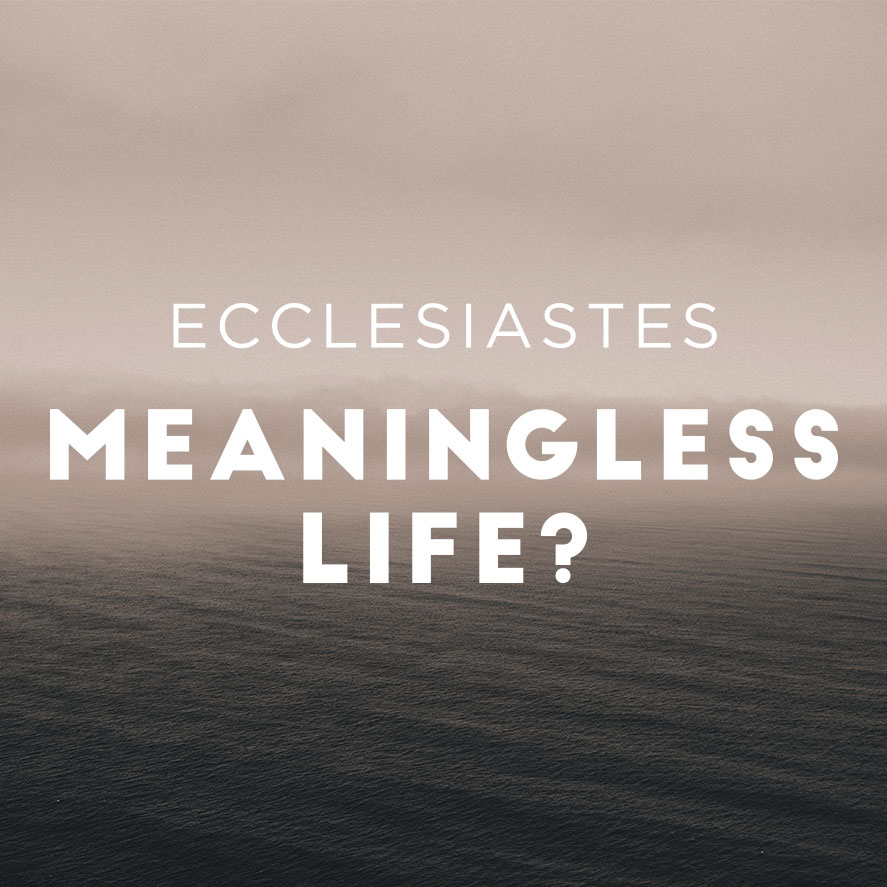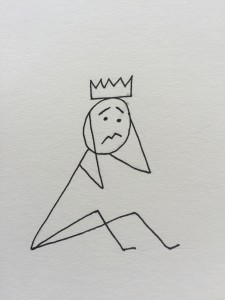
17 Aug Life, Liberty, and the Pursuit of Misery: Ecclesiastes 2:1-11
Ecclesiastes: Meaningless Life?
[Part 3]

Life, Liberty, and the Pursuit of Misery: Ecclesiastes 2:1-11 (Click Here for Audio)
In school, math was perhaps the most difficult subject for me. I was particularly bad at showing my work. On the rare occasion that I did get a problem correct in some convoluted way, my math teachers would mark my grade down, because even though I got the right answer I failed to show the process by which I arrived at this conclusion. My teachers didn’t just want me to get the right answers, but to understand how and why those answers were right.
I don’t know if my math teachers ever read the Bible, but if they did they would have been pleased to read Ecclesiastes. It is a book that shows us the math for the rest of the Bible. The Bible tells us that life apart from God lacks meaning, nothing apart from God is satisfying, and life is short and there’s no time to waste. In Ecclesiastes, we see how and why history’s wisest fool arrived at these conclusions. And, he shows us the math–the process by which he arrived at his answer.
Solomon’s timeless answer is as timely as ever. The nation I am blessed to live in is an experiment in “life, liberty, and the pursuit of happiness.” Basically, we all want to be happy, so we live solely for the pursuit of pleasure. Philosophers call this ‘hedonism.’
Curiously, the experiment is not going very well. Like the great King Solomon, we live relatively lavish and luxurious lives in comparison to history and other parts of the world. Yet, many, if not most people, are stressed and depressed. Why?
It seems that many people are coming to the same painful, brutal, awful conclusion as history’s wisest fool–that life lived only in the pursuit of what we enjoy invariably enslaves and disappoints us. Those of us at varying levels below Solomon on the food chain cling to the myth that if we could trade places with him we would be happy, satisfied, and joyful. However, the parade of history from Jim Morrison to Jimmy Hendrix, Elvis Presley, and Kurt Cobain sings the same meaningless song as Solomon.
Curiously, we spend much of our life worried that what we hate will destroy us. We fear that someone or something that we do not enjoy will overtake us and ruin our life. The truth is that what we love is more likely to destroy us. The things we voluntarily give ourselves to–such as comfort, food, alcohol, sex, power, money, loved ones, work, and pleasure—end up ruining us rather than satisfying us. This is the conclusion of the Bible, and in Ecclesiastes, Solomon shows us the math. As King, he ruled with complete authority. No one in his kingdom would dare tell him no. He lacked no resource of any kind. Imagine for a moment that you had unlimited access to all your desires. What would your life be like if you could have anything and anyone you wanted without restriction? That was the life of Solomon.
Before showing us the math, he also gives us the answer–life lived selfishly and without God is “meaningless.” Creating meaning in life by feeding our darkest fantasies is like trying to make a snowman out of pudding in the blistering sun of a hot summer day. You can go to college to get a degree in pudding stacking, rally together a few helpful friends who think you’ve found a way to do it, read books from theorists on how it can be done, and work every day for the rest of your life, yet all you will do is come to the same conclusion as everyone else–you wasted both time and pudding. If you do not believe the answer, then perhaps seeing the math will help as Solomon shows us all that he did to try to make life meaningful.
Here’s the punch list of what Solomon tried in his pursuit of stuffing meaning into a meaningless life: comedic laughter, alcohol drunk only in pure gold mugs (1 Kings 10:21), incredible real estate with massive palaces and private garden parks, a personal staff estimated at 10,000-30,000 servants committed solely to serving his every whim, the equivalent of his own private zoo with exotic animals from around the world, a ranch with 12,000 horses and 1,400 chariots imported from Egypt and Cilicia (1 Kings 4:26, 10:26-29), so much wealth that silver became worthless (1 Kings 10:10-27), on demand access to performances by his favorite artists, sex with any of the 1,000 wives and concubines, rock star fame, the highest IQ and greatest insight of anyone in the history of the world (other than Jesus Christ), a job he liked, and the power to do basically anything he wanted. Furthermore, all of this he enjoyed while sitting on a huge throne decorated with ivory and overlaid with gold, elevated by six steps, and surrounded by 14 hand carved lions and 500 custom hammered gold shields (1 Kings 10:20-27). Yes, even rap moguls would have drooled at his crib.
Honestly, would you be happier if your life was like Solomon’s? Nope.
Solomon basically worshipped himself. His selfishness drips throughout his report through phrases like, “cheer myself,” “building huge homes for myself,” “I had everything,” “I became greater,” and “anything I wanted I would take.” Solomon lived as a taker and not a giver. As the center of his own universe with everyone and everything orbiting around him, Solomon became miserable because he never learned the truth of Jesus’ words quoted in Acts 20:35, “’It is more blessed to give than to receive.'” This explains why God is the most blessed and joyful being: He is the most generous giver.
Solomon tried to find meaning by enjoying anything and everything apart from God but found it to be a meaningless waste of time. This just goes to prove that you can have a full fridge, full house, full closet, full bank account, full social life, full mind, full stomach, full liquor cabinet, full résumé, full bedroom, yet an empty soul. Everything minus God is nothing. Nothing plus God is everything.
Solomon arranged every aspect of his external world so as to afford him maximum pleasure. However, he never experienced enduring happiness and satisfaction because his internal condition remained sinful and the highs of life eventually faded. He painfully learned that happiness is a gracious gift from God that comes by being and not by having.
The issue is not having a little or having a lot. Poverty theology will tell us that joy comes in having less. Conversely, prosperity theology will tell us that joy comes with having more. The truth is that while on the earth, Jesus was poor and had very little. Today in his heavenly kingdom, the Lord Jesus is no longer poor. He instead sits on a throne bigger than Solomon’s and rules over a New Jerusalem with streets paved in gold, Revelation reveals. Throughout the Bible, there are godly joyful people who are rich and poor and ungodly miserable people who are rich and poor.
This is what Paul mean in 1 Timothy 6:6, “true godliness with contentment is itself great wealth.” With wealth, you can buy many things, but wealth cannot purchase contentment. That is precisely what Solomon lacked and why he found that, ultimately, his wealth was meaningless.
In the end, there is a difference between stuff and satisfaction. Without God, we may have stuff, but as the Rolling Stones rightly declare, we “can’t get no satisfaction.” And that is the chorus for this section of Solomon’s reflection.
Questions For Personal and Group Study Ecclesiastes 2:1-11
- In your past, what things have you pursued apart from God hoping that they made life meaningful and enjoyable?
- Did those pursuits provide the lasting internal peace, joy, and satisfaction that you had hoped for? Why or why not?
- Is there anything in your present that you are pursuing apart from God hoping that it makes your life meaningful and enjoyable?
- In being so honest about his life, Solomon helps us to learn from his experience. What things in your life experience could similarly be useful to share with others?
- What insight(s) from Solomon’s showing us the math for the rest of the Bible were most helpful to you? Why?
- Do you believe that Solomon’s conclusion (that apart from God even the best things in externally life fail to satisfy us internally) is earnestly true for you?
- Click [here] to listen to the entire sermon.
Coming up next week Meaningless Life Part 4: Joining God in the Pool: Ecclesiastes 2:12-26


